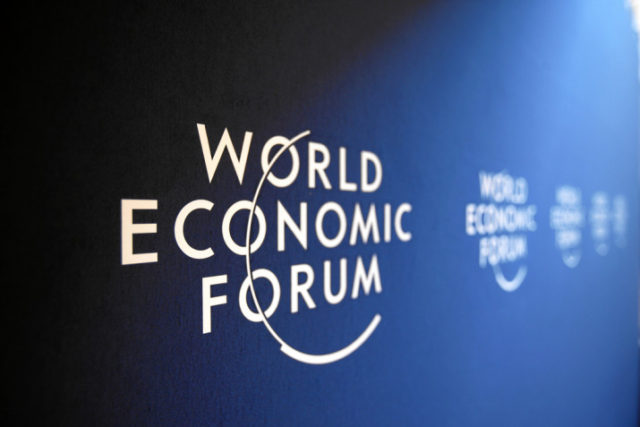- The pace of technological change is accelerating convenience but undermining trust
- Automation of work and data is fuelling populist mistrust of technology and fears about jobs and privacy
- Unless tech CEOs put values and trust at the core of their companies, more regulation is inevitable
- The 48th World Economic Forum Annual Meeting is taking place on 23-26 January in Davos-Klosters, Switzerland, under the theme Creating a Shared Future in a Fractured World
For more information www.weforum.org

Davos, Switzerland, 23 January 2018 – The speed of technological change is accelerating convenience at the expense of trust, raising questions about tech companies’ values, intentions and responsibility to consumers, argued a stellar panel of participants on the first day of the World Economic Forum Annual Meeting.
The Kalamazoo shootings of February 2016, when Uber driver Jason Dalton shot six people dead, raised questions about whether “convenience is trumping trust,” said Rachel Botsman, Visiting Academic and Lecturer at the Saïd Business School, University of Oxford, United Kingdom. “Trust needs a bit of friction,” said Botsman – we need to slow down and assess what’s risky and what isn’t.
Uber does use data to create safer experiences, said Dara Khosrowshahi, Chief Executive Officer of Uber Technologies, USA. In Mexico City, for example, the ride-sharing service blocks ride requests from areas where carjacking is a risk at certain times of day. “Ratings are real,” said Khosrowshahi, and a user has more information on their driver than if they hailed a taxi. But ultimately, “a 4.9 is a rating of how they drive, not the state of their mind.”
The deeper issue at stake is whether the big tech companies are doing enough to build trust in their values and intentions. Under its previous chief executive, Uber suffered from a “growth at any cost” culture, exposed by whistleblower Susan Fowler. But, in the world of new, connected products and services – the Fourth Industrial Revolution – “trust has to be the highest value in our company,” argued Marc R. Benioff, Chairman and Chief Executive Officer of Salesforce, USA, adding: “If anything trumps trust, we’re in trouble.”
CEOs need to be more transparent about the values they embrace. For Benioff, equality is key, especially in terms of employee pay and promotion. For Ruth Porat, Senior Vice-President and Chief Financial Officer of Alphabet, USA, Google’s core value is respect – for the user, for the opportunity and for one another. Highbrow values are fine, but do companies’ intentions measure up? Amazon’s Alexa now has a built-in camera that can rate what a person is wearing, recommend upgrades to their wardrobe and order with a single click. Is it right that technology not only does things for us, but also decides things for us? Online retailers such as Amazon now gather so much data that they know more about users than the users themselves, raising serious questions about the privacy of that data and who has the authority to use and monetize it. Botsman asked: Is technology encouraging us to give away our trust too easily?
The signs are pointing towards more regulation, according to Benioff. “When CEOs don’t take responsibility, then governments have no choice but to step in,” he said. Benioff likened the accelerating power of today’s technology to the complex financial products of a decade ago. Regulators weren’t paying sufficient attention then, and the headlong rush into mortgage-backed derivatives and the like created the worst financial crash for generations. Regulators need to adapt much faster to the new reality.
There is a political angle to this argument too, said Sir Martin Sorrell, Chief Executive Officer of WPP, United Kingdom, one of the world’s largest advertising companies. The spread of artificial intelligence, driverless cars and stores with no workers or check-outs is making ordinary people nervous. These voters are less worried about trust than about whether their job is secure – and this populism is sure to have an impact at the ballot box. Automation might bring prices down, but chief executives and governments alike need to take on the task of skills training with far greater urgency. With the tech space increasingly dominated by a handful of huge players, such as Apple, Google and Facebook, regulation of data sharing, privacy and responsibility for platform content is an increasingly urgent issue, argued Sorrell.
Ultimately, however, we cannot rely on regulators alone to solve these problems. In the case of newsfeeds, argued Botsman, do we want Facebook or regulators to be the arbiters of truth – or is that role best left to users themselves?
The World Economic Forum’s 48th Annual Meeting is taking place on 23-26 January 2018 in Davos-Klosters, Switzerland. More than 3,000 leaders from around the world are gathering in a collaborative effort to shape the global, regional and industry agendas, with a commitment to improve the state of the world.
The World Economic Forum, committed to improving the state of the world, is the International Organization for Public-Private Cooperation. The Forum engages the foremost political, business and other leaders of society to shape global, regional and industry agendas. (www.weforum.org).
